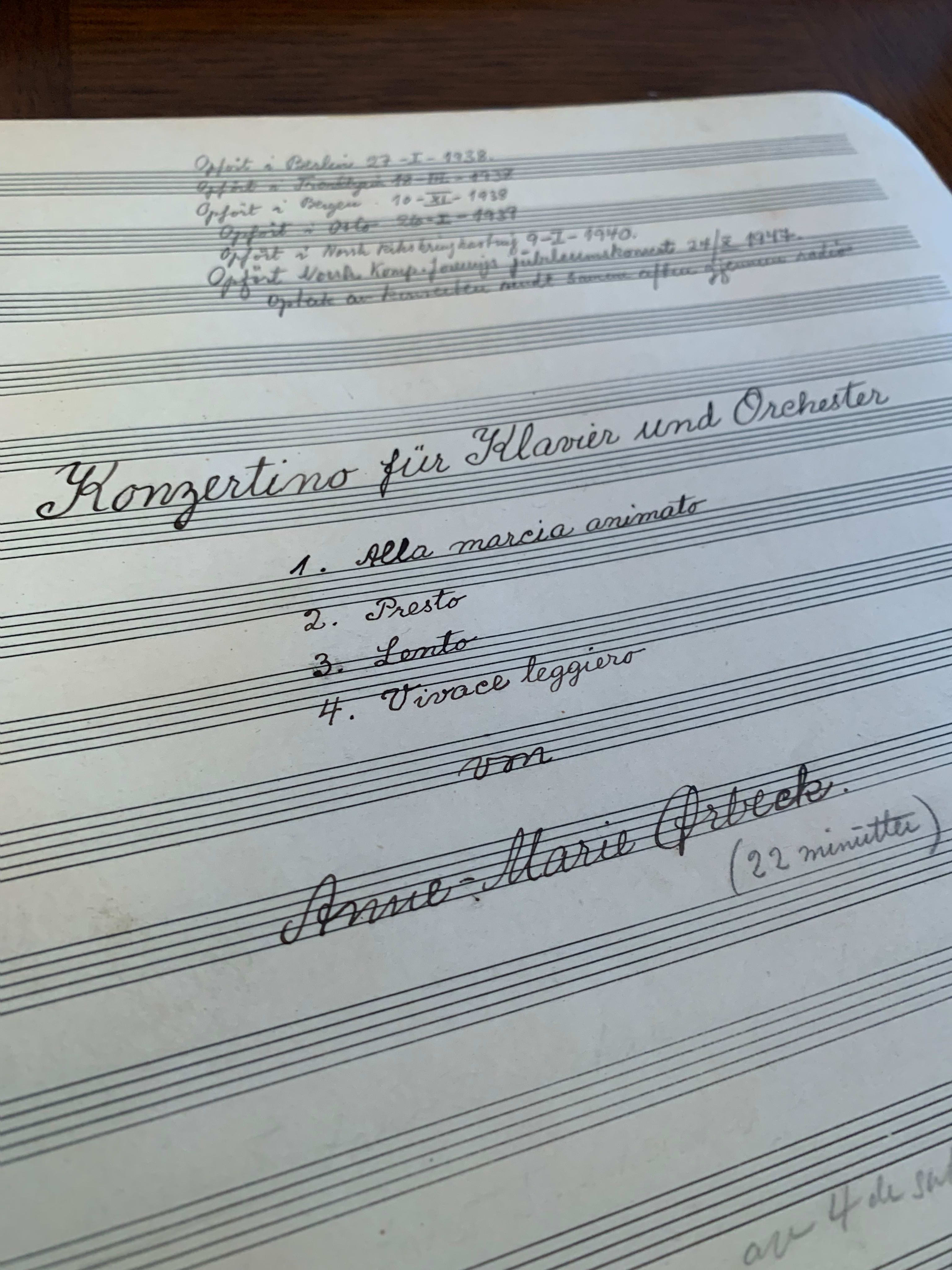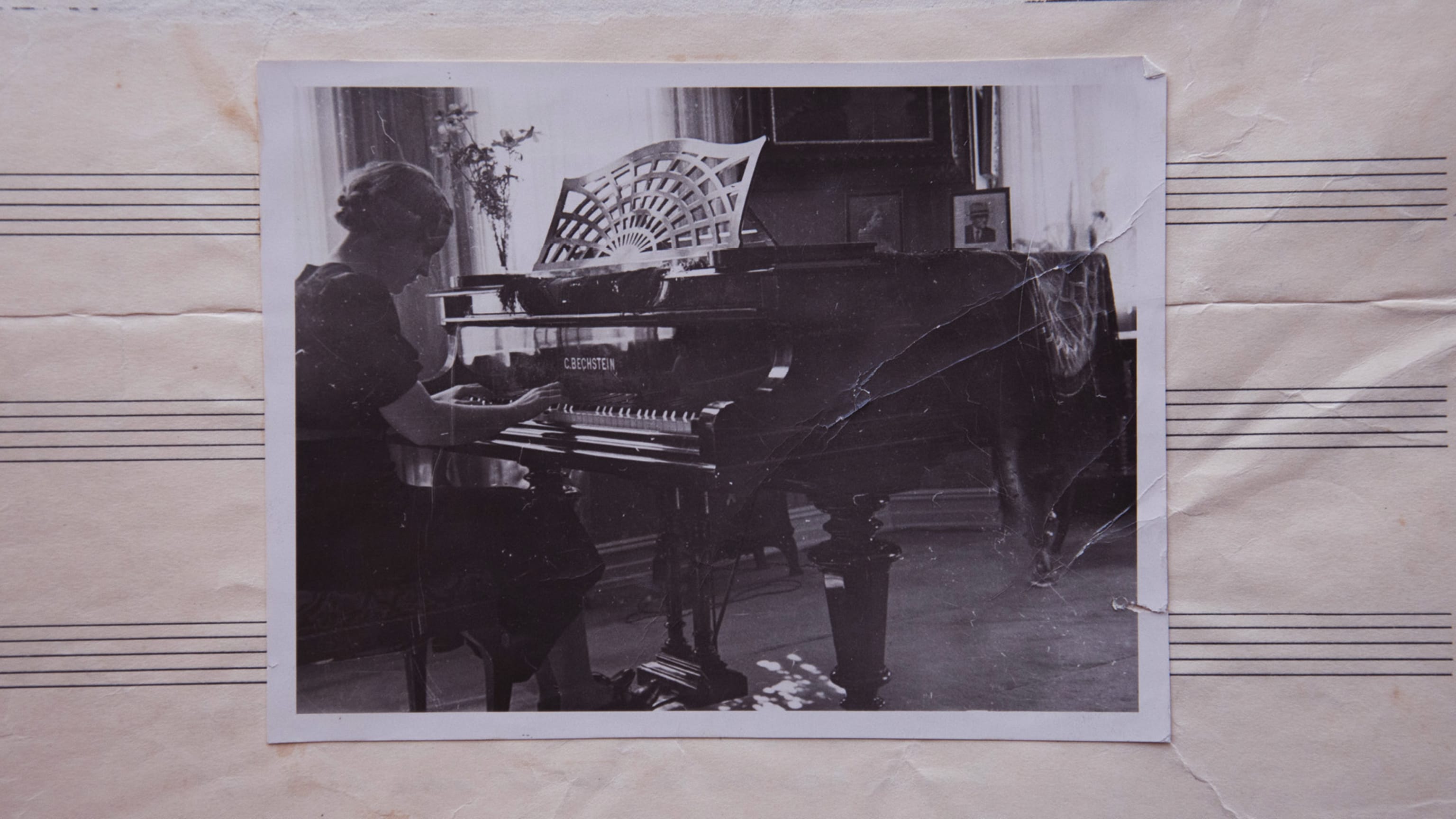On changing music in a changing homeland
- Home
- Festival
- 2021
- Articles
- On Changing Music In A Changing Homeland
- By:
By: Ketil Mosnes
March 25, 2021
An encounter with Missy Mazzoli, the 2021 Festival Composer.
Missy Mazzoli is considered one of the most innovative, exciting and acclaimed young composers currently operating in the United States. The 40-year-old New York-based artist has been referred to as ‘Brooklyn's post-millennial Mozart’ (Time Out New York), while LA Times described her music as ‘(…) seductive, meditative, spiritually elusive and subversive. With it, we can welcome a new natural for the art form.’ Over the recent years, her music has been performed by the Kronos Quartet, LA Opera, New York City Opera, the LA Philharmonic, the Sydney Symphony Orchestra and many, many others.
Mazzoli, who was Grammy-nominated for her release Vespers for Violin in 2019, is currently the Mead Composer-in-Residence at the Chicago Symphony Orchestra. Previously, she has worked with, among others, the Opera Company of Philadelphia and the Washington National Opera, as well as performed with her own electro-acoustic band Victoire. Her opera Breaking the Waves, an adaptation of Lars von Trier's movie, won the inaugural Music Critics Association of North America Award for Best New Opera in 2017. She has also written parts of the score for the television series Mozart In The Jungle.
In the music press, Missy Mazzoli is often described as an artist who breaks barriers for new composers and listeners. In a feature on NPR (National Public Radio), she is quoted on saying that her ideal listener wouldn't know anything about her or her music, so that they wouldn't have a preconceived idea about what her music should be, based on its labels.
Mazzoli has also co-founded the New York-based Luna Composition Lab. Through annual fellowships, the lab encourages the composition careers of young women, non-binary people, and gender-nonconforming people aged 12 to 18, providing them one-on-one mentorship, performance opportunities, and a ready-made network of composers who look like them.
As a female working in a mostly male-dominated environment, Mazzoli has sometimes been outspoken about gender roles and injustice within the opera world. In an interview with New York Times, she said: ‘What I see a lot is that men are given opportunities based on potential […]. With women, people are always waiting to see proof. They want to see that you've done something before they give you an opportunity. You can see the impossibility of that situation. If you're a young woman and you have a dramatic impulse and you are attracted to that art form but no one's going to give you your first big break, it becomes impossible to break into that world.’
In the interview below, which Bergen International Festival did with Mazzoli in December 2020, she talks about her view on the current state of America, the Luna Composition Lab, and other topics:
– Can you say a few words about the transition from working with Victoire to composing opera? What inspired you to go in that direction?
– I don’t think of it as a transition as much as parallel streams of working. I still perform with my ensemble Victoire, as a soloist and with other collaborators; performing is an essential part of my practice and one of the most direct ways I have of connecting with an audience. Running parallel to that is a lifelong interest in drama and musical storytelling.
Even my early instrumental works have a very clear narrative thread to them, and I’ve always wanted to express these narratives through large-scale, collaborative, dramatic works. But it’s almost impossible to create an opera by oneself, and the doors that started to open for me about eight years ago were financial and structural.
Opera productions are really the result of the combined efforts of hundreds of people, so it wasn’t until I had the support of organizations like Opera Philadelphia, Beth Morrison Projects and the Norwegian National Opera that I was able to fully realize my most ambitious projects. All that said, opera feels like the right thing to be writing right now. We’re living in such dramatic, inherently operatic times, and audiences look to art in part as a way of investigating and interpreting the modern world.
My most recent opera, for example, explores the effect of a charismatic cult leader on a small suburban community. This story has parallels all over the world as nations grapple with extreme nationalism and right-wing populism.
– I read a piece about your album Vespers for a New Dark Age on NPR, where the journalist wrote: ‘I’d play it for people who would never go to a classical concert’. Is that an opinion you would agree on? And if so, why?
– I think the journalist meant this to be a compliment, and I’m grateful for anyone who writes about my work, but there’s something about this statement that implies assumptions about what audiences will find interesting and what we define as 'classical', both of which make me uncomfortable. I have a very hard time labeling my own work, since it is basically the story of my entire world, but I like to believe that it can exist along works by Beethoven as well as works by Aphex Twin, Hildegard von Bingen, Laurie Spiegel – my list of influences is long and varied, and I get uncomfortable when writers or audience members make me self-conscious about genre. I don’t think about genre when I’m writing, so I’d prefer people not think about genre when listening. I just think there are more interesting things to speak about in my work instead of dredging up the old genre wars.
– What was the main objective behind establishing Luna Composition Lab, and which possibilities does it represent for those involved?
– In 2016 composer Ellen Reid and I, in partnership with the Kaufman Music Center here in New York, founded Luna Composition Lab as a way to address the persistent gender imbalance in the music scene. Both Ellen and I had a difficult time navigating this lopsided field in our teens and twenties, and we both vowed to use whatever success we had to make the path a bit easier for later generations of composers who did not identify as male.
Some of the main barriers to entry for non-male composers are a lack of role models in positions of power and a lack of support in one’s teens, so we started a program that connects female-identifying, non-binary and gender nonconforming composers ages 12-18 with prominent mentors in the field. Each spring we bring these composers and mentors to New York for a weeklong festival that includes a concert of their works, masterclasses, workshops, networking events and tours of New York’s cultural institutions including The Metropolitan Opera House.
It’s empowering to be surrounded by peers and mentors who look like you and share some of your life experience, and composers who are not white men rarely get that experience. We’re already seeing the profound impact of these efforts; graduates of the program have gone on to some of the best college composition programs in the country and have already received commissions from some of our largest orchestras and institutions.
– As a performer, composer and listener you are involved in numerous musical genres. With basically all kinds of music so easily available through internet platforms, how do you navigate? Are there any specific elements you are looking for when discovering new artists or genres?
– I’m lucky enough now that a lot of artists will send me their new music as it is released, and one of the true gifts of social media in December is the plethora of year-end lists from critics, fellow artists and curators. I’m always looking for artists who eschew easy genre categorization and who make big, bold statements. This month I’m listening a lot to black metal band Liturgy’s new opera Origin of the Alimonies, Caroline Shaw’s new record Narrow Sea, and Sarah Hennies’s album The Reinvention of Romance.
– In terms of composition, how’s the future looking? Do you want to continue with opera, or are there other genres or musical styles that you feel like exploring?
– Opera is an incredibly powerful storytelling tool of the modern age, and I feel like I’m just beginning to scratch the surface and discover the real power and potential of the genre. That said, I’d also love to create large scale immersive installations, would love the opportunity to write more film scores, and collaborate with more artists outside of music.
From an artist’s point of view, do you feel that four years of Trump presidency have affected music and culture in the US in any specific way? If so, in what way?
– Trump has been a black hole for American culture in the sense that he sucks up all the oxygen and energy on a daily basis. Artists in general don’t seem to want to contribute to the vortex by creating works overtly about Trump, but he’s inescapable, and in a sense everything I’ve written in the last four years has referenced Trump in some way. My third opera, Proving Up, which I started in the weeks following the 2016 election, is a searing commentary on the harsh realities of the 'American Dream', a dream made even more distant during Trump’s presidency. My fourth opera, The Listeners, tracks the effects of a smooth-talking, charismatic cult leader as he manipulates a vulnerable community for his own needs and pleasure. In America it’s impossible, at this point, to have any distance from the Trump presidency. It surrounds us and we have no idea what to expect day to day. I’m curious how artists of the future will reflect on this era but it’s hard to have any perspective from within the center of the maelstrom.
– With the vaccine roll-out under way, and a new president who will take office in January, do you sense a bit of optimism now?
– When Biden was elected, my stomach relaxed for the first time in four years, but America’s problems transcend any one presidency. The last months of pandemic, social unrest and a turbulent election have revealed a lot of ugly truths about this country, so my optimism is tempered by a recognition of how long the road ahead will be. But we’ve staunched a bleeding wound for now, which is the first step to survival.
– You are the festival composer and artist in residence at the 2021 edition of the Bergen International Festival. In terms of working methods, how do you prepare for such an assignment?
– I’m thrilled to participate in the Bergen Festival as a composer, curator, advocate and performer. I’m preparing by writing a lot of new music for the Mogens Dahl Chamber Choir, music that will receive its world premiere on the festival. (Ed.: This concert has now been postponed.) I’m also preparing to rehearse some of my larger orchestral works with Norwegian orchestras, and am preparing a program that focuses on the work of young female-identifying, non-binary and gender nonconforming composers.
Supported by Vestland county council






